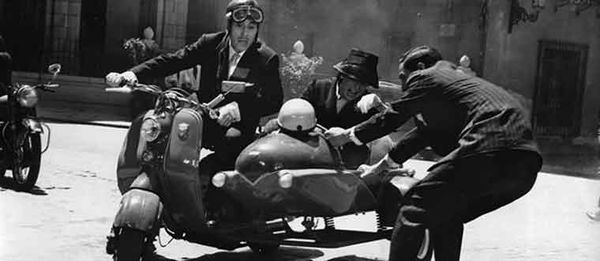Eye For Film >> Movies >> The Executioner (1963) Film Review
The Executioner
Reviewed by: Rebecca Naughten

A darkly comic indictment of State violence (and, arguably, State bureaucracy), The Executioner (El Verdugo) is Luis García Berlanga's avowed masterpiece, one which it seems miraculous that he got past the censor (15 minutes were cut - most of them are now reinstated). Working as an undertaker ("your job is very secure") José Luis (Nino Manfredi) meets the unassuming executioner Amadeo (José Isbert) at the State prison during the course of carrying out their respective duties. Through a series of unfortunate events - namely getting Amadeo's daughter Carmen (Emma Penella) pregnant outside of wedlock - the young man finds himself enmeshed in the executioner's family and, when Amadeo retires, forced into the family profession in order to keep the new familial home (which is allocated by the State).
José Luis is unsuited to his new profession - coming over queasy at the sight of the tools of Amadeo's trade - and takes to intervening in public disputes so as to avert potential capital offences, and nervously follows criminal court cases in the press. Every time he baulks at the next requirement of his new duties, Carmen and Amadeo override his fears through a combination of guilt ("think of [your] child") and placation ("They'll issue a pardon"). When he is finally notified of an imminent execution in Palma de Mallorca - which Carmen and Amadeo view as an opportunity for a family holiday - he cuts an absurd and increasingly frazzled figure in his holiday garb while pacing the prison yard.

Co-scripted by one of the key figures in Spanish cinema - Rafael Azcona - the film is laced with both deadpan and sly humour, and is laugh out loud funny. The deadpan comedy usually issues forth from Amadeo who, while railing against the lack of bravery on the part of the modern criminal ("the race is deteriorating"), feels that his profession is misunderstood - "People who say the garrotte is inhuman make me laugh. Is the guillotine better? Should we bury a man in pieces?"
Isbert's stock in trade was the grumpy little man who is often down but never out - he was beloved by the Spanish public and this is one of his finest performances. In dangerously poking fun at convention, or the Establishment, the slyness in The Executioner is often conveyed visually rather than verbally - as seen in the way José Luis's shotgun wedding cuts costs by taking place in the immediate aftermath of a society wedding, which is packed up around them until even the lights are extinguished, with each of the priests taking a cut of the 'takings'. But there are frequent visual gags in the background and all manner of absurdity in the situations the characters find themselves in.
However, it is the film's strong sense of humanity that gives its satirical edge such a kick - the lasting image of the film is that of José Luis following behind the condemned man and having to be physically supported and near-dragged by the prison guards such is his aversion to the task he must carry out. Berlanga had problems with the censors throughout the early stages of his career, but the foreign attention given to The Executioner (it won the FIPRESCI prize at Venice) - which occurred in the ongoing wake of the scandal surrounding Viridiana (Luis Buñuel, 1961) - meant that the government did its best to bury the film at home. Berlanga subsequently found it extremely difficult to get films made in Spain during the remainder of the dictatorship and would only return to regular filmmaking after Franco's death. His films are rarely shown in the UK - it is well worth taking the opportunity offered by the Leeds Film Festival 2014 retrospective to see his finest work.
Reviewed on: 09 Nov 2014













